Naked Killer
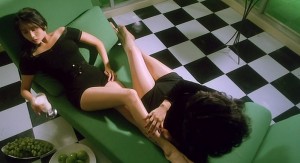 The Hong Kong equivalent of Jerry Bruckheimer, writer/producer/director Wong Jing has been cashing in on trends for so many years, it’s no wonder that his movies are completely dated within a year. Watching films like City Hunter, where Jackie Chan dresses up as every character from the Street Fighter 2 video game, or the inane Fight Back to School series, which would kindly be described as insulting to the intelligence, makes this notion apparent. Naked Killer was his attempt to capitalize on the newly popularized Category III genre, which is on par with the US version of an NC-17 rating. That Naked Killer became a huge hit is not surprising, with its mix of graphic violence and sex, both lesbian and heterosexual. Most of this should be credited to director Clarence Ford, whom Jing hired to add a stylish and unique nature to the film. Unfortunately, Jing’s influence is everywhere in the film, from his tendency to pluck from American films and throw them in at inappropriate times, in this case Basic Instinct, to inane dialogue and crude jokes which constantly undermine the film itself.
The Hong Kong equivalent of Jerry Bruckheimer, writer/producer/director Wong Jing has been cashing in on trends for so many years, it’s no wonder that his movies are completely dated within a year. Watching films like City Hunter, where Jackie Chan dresses up as every character from the Street Fighter 2 video game, or the inane Fight Back to School series, which would kindly be described as insulting to the intelligence, makes this notion apparent. Naked Killer was his attempt to capitalize on the newly popularized Category III genre, which is on par with the US version of an NC-17 rating. That Naked Killer became a huge hit is not surprising, with its mix of graphic violence and sex, both lesbian and heterosexual. Most of this should be credited to director Clarence Ford, whom Jing hired to add a stylish and unique nature to the film. Unfortunately, Jing’s influence is everywhere in the film, from his tendency to pluck from American films and throw them in at inappropriate times, in this case Basic Instinct, to inane dialogue and crude jokes which constantly undermine the film itself.
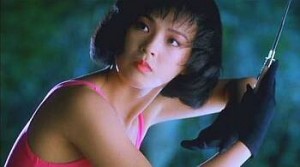 One scene has a cop mistaking a cut off penis for a sausage, and enthusiastically chomping away at it, followed by his dialogue, supposedly unaware of what he has done, “Do you think I ate a dick?” In fact, when I first saw the movie on VHS years ago, the subtitles were so poor, that I couldn’t sit through it, and knew I would have to wait for a better translation. Now that Hong Kong Legends has provided one, along with a previously unseen uncut version (the Fox R1 disc has been cut by about 11 minutes for an R rating), I realize that the dialogue is simply that poor.
One scene has a cop mistaking a cut off penis for a sausage, and enthusiastically chomping away at it, followed by his dialogue, supposedly unaware of what he has done, “Do you think I ate a dick?” In fact, when I first saw the movie on VHS years ago, the subtitles were so poor, that I couldn’t sit through it, and knew I would have to wait for a better translation. Now that Hong Kong Legends has provided one, along with a previously unseen uncut version (the Fox R1 disc has been cut by about 11 minutes for an R rating), I realize that the dialogue is simply that poor.
Trying to follow the story seems almost insignificant, as one character says, “Go and save the logic for Sherlock Holmes.” This is a movie about poses and trailer shots, flashy gunplay, deep colors, and an aversion to coherence. Obviously this is all intended as trash, but to an uninitiated audience it will appear as if the director forgot which character was which. It didn’t become clear to me who had committed which murder until a second viewing with the commentary track on. This is especially true as the movie becomes more and more contrived. Basically, a cop, still distraught after accidentally killing his brother while in the line of duty, is after a professional killer, whose calling card seems to be his/her brutality, playing techno versions of Mozart, and a need to stab men in the genitals. He comes across a woman whom he thinks is the killer, based on the nature of her violent attack against a man who was slapping another woman. Of course, the cop falls in love with her. But she is not a trained killer at this point, not until her father is killed by his wife’s lover, and she goes to hunt him down at his office. Despite no previous evidence, she seems to be a crack shot, and upon her escape, takes another woman hostage to drive her away from her pursuers chasing her out of the building. That the kidnap victim just happens to be someone who trains professional killers is not the only time you will roll your eyes at the plot development. Though the resulting kung fu fight in the parking garage is wildly over the top and furiously energetic.
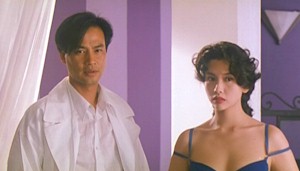 Since visceral thrills are really all that matters to Jing, effects like this are everywhere. A waiter is catering to his customers in a restaurant, and for no reason, walks outside across the street, just so he can be run over by a car. Is this type of thing to be forgiven considering that the movie was obviously shot so quickly and without much thought? If the film were more consistently entertaining and the actors seemed more enthusiastic, I’d have to say yes. There are some truly striking sequences, one has a couple making love in a swimming pool, right after they have killed a man, and the camera follows the blood in the water as it reaches the two women amidst coitus. The colors scheme is generally beautifully especially with the use of blown out lighting, the actors being bathed in light through windows. But the biggest problem lies in that the actors seem so uncomfortable during the numerous sex scenes. Sometimes, they are playing a part, attempting to dupe their partner into thinking they are truly on their side, sometimes they are supposed to be in the moment. However, since the actors are so awkward and guarded in either scenario, especially the women during the lesbian scenes, lacking the passion they are supposed to have, that element of the exploitation is tarnished.
Since visceral thrills are really all that matters to Jing, effects like this are everywhere. A waiter is catering to his customers in a restaurant, and for no reason, walks outside across the street, just so he can be run over by a car. Is this type of thing to be forgiven considering that the movie was obviously shot so quickly and without much thought? If the film were more consistently entertaining and the actors seemed more enthusiastic, I’d have to say yes. There are some truly striking sequences, one has a couple making love in a swimming pool, right after they have killed a man, and the camera follows the blood in the water as it reaches the two women amidst coitus. The colors scheme is generally beautifully especially with the use of blown out lighting, the actors being bathed in light through windows. But the biggest problem lies in that the actors seem so uncomfortable during the numerous sex scenes. Sometimes, they are playing a part, attempting to dupe their partner into thinking they are truly on their side, sometimes they are supposed to be in the moment. However, since the actors are so awkward and guarded in either scenario, especially the women during the lesbian scenes, lacking the passion they are supposed to have, that element of the exploitation is tarnished.
This review refers to the Hong Kong Legends Region 0 PAL version of Naked Killer.
Video:
The image is a bit too soft compared to a Hollywood production, but for a Hong Kong quickie, this is an acceptable look, and the anamorphic transfer is miles better than other versions I have seen. The subtitles are so transparent that they look like they will fade out at any moment, so you may have to do a bit of squinting to catch all of them.
Audio
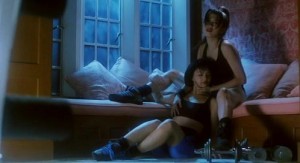 Typical to what Hong Kong Legends generally provides, this is a mono soundtrack thinned out to 5.1, but certainly not as harsh as some of the Megastar stuff, and not nearly as tinny as it could be.
Typical to what Hong Kong Legends generally provides, this is a mono soundtrack thinned out to 5.1, but certainly not as harsh as some of the Megastar stuff, and not nearly as tinny as it could be.
Extras:
This footage is more revealing and interesting than the film itself especially in the interviews. All of them are presented in anamorphic widescreen. The first one is with director Clarence Ford who explains that Naked Killer comes from a Shaw brothers movie called Intimate Confessions of a Chinese Courtesan which he saw as a child. He wanted to update with more kung fu (Michelle Yeoh turned the role because of the graphic sex scenes). He explains that the sex scenes are made up of very few shots since he gets bored filming them, that the trailer was shot before the movie (not surprising, as the movie plays like a trailer for itself) and the casting and kung fu training process, which he claims was three months, despite the movie being shot in only 18 days.
Wong Jing’s interview explains that he is the result of nepotism whose father made 250 movies. He gives the quintessential clichéd producer speech, how each film must have certain elements, how he sees filmmaking as a means to have a conversation at lunch about how successful his film is (his version, not mine), talks in terms of predicting trends and following them, no matter how bad the movie ends up, etc. He also expends a lot of time talking about how the actresses in the movie were so good looking.
If the feeling of a mind numbing factory wasn’t evident, lead actor Simon Yam talks about his attempts to act in more films than anyone else.
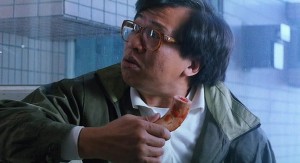 There is a commentary with Ford and critic Jude Poyer which reveals the hectic schedule of the shoot and that Ford trained with the Jackie Chan stunt team for three years. Ford seems constantly surprised and happy during the commentary, as all of the more violent footage was cut before he ever saw it. He reveals that the movie was released one week after he finished shooting it, and how Wong Jing was constantly trying to imprint himself on a scene, at one point Ford confirms that he had nothing to do with a scene or two which appear in the film. To be honest the movie played significantly better the second time when I was watching it this way, odd for an exploitation movie, which tend to decrease in entertainment value, the more you examine them. This is because I was willing to forgive so much, now understanding the circumstances under which the film was made. It might have been because I just felt sorry for Ford.
There is a commentary with Ford and critic Jude Poyer which reveals the hectic schedule of the shoot and that Ford trained with the Jackie Chan stunt team for three years. Ford seems constantly surprised and happy during the commentary, as all of the more violent footage was cut before he ever saw it. He reveals that the movie was released one week after he finished shooting it, and how Wong Jing was constantly trying to imprint himself on a scene, at one point Ford confirms that he had nothing to do with a scene or two which appear in the film. To be honest the movie played significantly better the second time when I was watching it this way, odd for an exploitation movie, which tend to decrease in entertainment value, the more you examine them. This is because I was willing to forgive so much, now understanding the circumstances under which the film was made. It might have been because I just felt sorry for Ford.
Also included is a UK promotional and original trailer, lead actress, Chingmy Yau’s bio and trailers for other HKL discs, Ninja in the Dragon’s Den, Mr. Vampire, Body Weapon, Police Assassins, Red Wolf, Police Story, Once Upon a Time in China 3, Zu: Warriors of the Magic Mountain (original), Scorpion King, and Iron Fisted Monk.
Overall:
Naked Killer is extremely tame compared to more recent exploitation fare from directors like Takashi Miike, but it has enough buoyant energy to distract you at certain points, if you aren’t paying close attention to the details. The extras are far more interesting than the film itself, at least in terms of revealing the cynical, corporate nature of producer Wong Jing.



